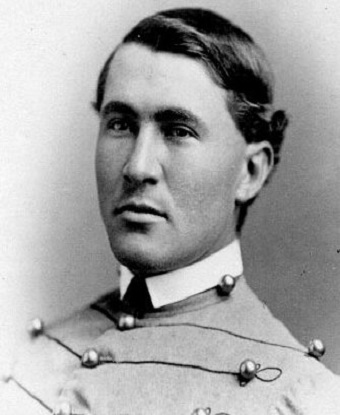Last updated: June 10, 2020
Person
Frederick Dent Grant

NPS/Library of Congress
Frederick Dent Grant was the oldest child of Ulysses and Julia Grant. For most of his adult life he served in the U.S. Army and enjoyed a successful career in his own right, attaining the rank of Major General by the time of his death.
Frederick Grant was born in St. Louis, Missouri, on May 30, 1850. He recalled his early life in several interviews during his later years: "My first firm memories of my father were at my mother's farm, White Haven, near St. Louis. My father was an industrious and stirring man and he built himself a log cabin there, cutting the trees and hewing them. He had but little help, though I would accompany him sometimes. I watched him split the logs and it was hard, difficult labor. I never saw a man work so diligently." Since Frederick was the eldest child, he was treated "always as if I were already a man." He also recalled that "I, being the oldest, was permitted to accompany [my father] about the farm, and he began to teach me, at an early age, to ride and to swim. I can see myself now, a chubby little chap, sitting on the back of one of the farm horses and holding on for dear life, my father urging me to be brave . . . my father [also] gave me a series of home lessons, instructing me in the evening. He taught me arithmetic, reading and spelling and in the evenings would read aloud to the family. I distinctly remember that one of the periodicals he used to read was from the works of Charles Dickens. My father read stories aloud to us, and I have yet a vivid recollection of "Little Dorrit" and other tales. Besides the serial stories, he read Oliver Twist and many books by standard authors."
Grant took an early interest in military affairs and, with the encouragement of his parents, occasionally joined his father on the battlefield during the American Civil War. Frederick was present with his father during the Vicksburg campaign, including the entire 45-day siege of the city. At one point during the campaign Frederick was shot in the leg by a Confederate bullet, although he made a full recovery. Ulysses S. Grant recalled that his son "caused no anxiety either to me or his mother, who was at home. He looked out for himself and was in every battle of the campaign." In late 1863 Frederick became deathly ill with typhoid fever, but was able to make a full recovery.
Like his father, Frederick Grant was appointed to the U.S. Military Academy. He began his studies in 1866 and finished in 1871 towards the bottom of his class, 37th out of 41 graduates. He was known as a troublemaker and received many demerits while at West Point. During a formal investigation of a hazing incident against underclassmen in 1871, he admitted to knowing about and supporting the prank. There were also rumors that he harassed and made racist comments to James Webster Smith, the first black cadet to attend West Point. Several investigations into the matter were conducted by West Point officials and eventually made their way to President Ulysses S. Grant's desk, but Frederick was never interview or implicated in the scandal. He did state at one point, however, that he believed that the time had not yet arrived for prospective black cadets to attend West Point.
Grant spent most of his adult life in the U.S. Army and served at posts throughout the United States and abroad. After West Point he spent several years at frontier posts in the West. Away from the military, Grant spent seventeen years in both the private sector and government. From 1889 to 1893, he served as U.S. Minister to Austria-Hungary during Benjamin Harrison's presidency, and from 1895 to 1897 he served as a Commissioner of Police of New York City along with Theodore Roosevelt. With the outbreak of the Spanish American War in April 1898, Grant offered his services back to the U.S. Army and remained there for the rest of his life. Over the next few years he served in Puerto Rico, the Philippines, Texas, Kansas, and Illinois, among other places.
Grant married Ida Marie Honore in 1874 and they had two children together. Like his father, Frederick Grant was a heavy smoker and died of throat cancer on April 11, 1912 at the age of 61.
